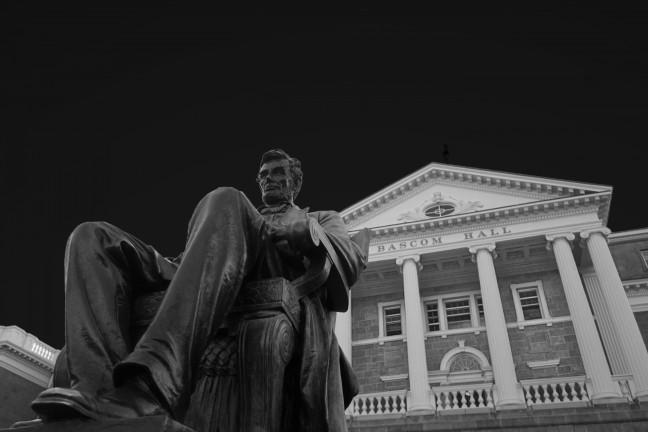A report detailing the history of the Ku Klux Klan at the University of Wisconsin, what it means for campus today and what the university is doing to confront this history was released Thursday.
In light of renewed national discussion related to racism and bigotry in the U.S., UW Chancellor Rebecca Blank commissioned a study group to examine the history of the KKK at UW and posit recommendations to improve the current campus climate in light of its findings.
The study group, commissioned in fall 2017, was co-chaired by Stephen Kantrowitz, a UW history professor, and Floyd Rose, the president of 100 Black Men of Madison — an organization of black leaders who advocate for greater racial equity in the Madison area.
According to the study group’s final report, two student organizations at UW took the name “Ku Klux Klan” — one in 1919 and one in 1926. The report said Klan members were open about their affiliation, occupied leadership roles in key organizations on campus and formed their own fraternity — Kappa Beta Lambda — in 1924.
At the time, the university took no measures against the Klan’s open and outward presence on campus, the report said.
Part of the study group’s purview was to examine how the Klan and the culture of intolerance in that era continue to impact campus today. At Memorial Union, the legacies of two Klansmen are prominently displayed at the Fredric March Play Circle Theater and the Porter Butts Gallery.
But the study group found the Klan’s presence on campus to be a symptom, rather than a cause, of the intolerant and racist attitudes of the time. The report found there were broader problems which expanded beyond the presence of the KKK on campus.
“Our conclusion from reviewing the history is that the presence of Klan-named groups on campus was not the cause of the culture of intolerance in that era, but was rather a symptom of the culture of intolerance in that era — not unique to UW, but nonetheless present on this campus,” Kantrowitz said. “What needs addressing is not the actions of a few individuals, but rather the culture of that era and it’s legacies down to the present-day.”
Kantrowitz said the study group and its recommendations address the larger, “structural” problems that racism and intolerance pose to the university community, rather than “purging” the history of these men and the Klan’s presence on campus. The recommendations do not focus on renaming the rooms in Memorial Union emblazoned with the names of two Klansmen.
The group said the history of those who were Klansmen is complicated, and said Butts practiced “non-discrimination, mutual understanding, and openness to debate and protest” in his later years as director of the Wisconsin Union.
The study group outlined four proposals to confront UW’s history with the KKK and with racism at-large, beginning with a public history project “to recover the voices of campus community members, in the era of the Klan and since, who struggled and endured in a climate of hostility and who sought to change it.”
Kantrowitz and UW associate history professor Christy Clark-Pujara will convene a group over the summer to begin the process of designing and planning the project’s implementation. The university will be committing “significant” resources to the project — which Blank said could total as much as $1 million.
Another proposal to confront the history of racism at UW includes a “renewed commitment” to the departments of Afro-American studies, Chicanx studies, American Indian studies and Asian American studies. This commitment will come in the form of four new faculty members — one for each department — who will be jointly appointed with other departments, and will cost an estimated $360,000.
The university will also be making an effort to increase investment in “high-impact” recruitment programs in the Office of the Vice Provost for Diversity and Climate, and to retain students and faculty of color on campus — particularly those students and faculty who are first-generation or come from low-income backgrounds.
Blank said the recent unveiling of Bucky’s Tuition Promise — a program which covers the tuition costs and segregated fees of university students who come from families which earn less than $56,000 per year — will help in this effort.
The final proposal outlines increased investment in the Advanced Opportunity Fellowships program, which benefits students from historically marginalized groups.
The report said spending on AOF increased this year to $5 million, up from $3.75 million in 2010. Additionally, the report pointed to the 84 percent of Ph.D. graduate students from underrepresented communities who received funding support last year — up from 79 percent six years ago.
Blank said she was appreciative of the study group’s work, and looks forward to implementing its proposals.
“I very much appreciate the new recommendations coming out of the report,” Blank said. “If we don’t understand history, we’ll be destined to repeat it — and this is history we need to understand.”













